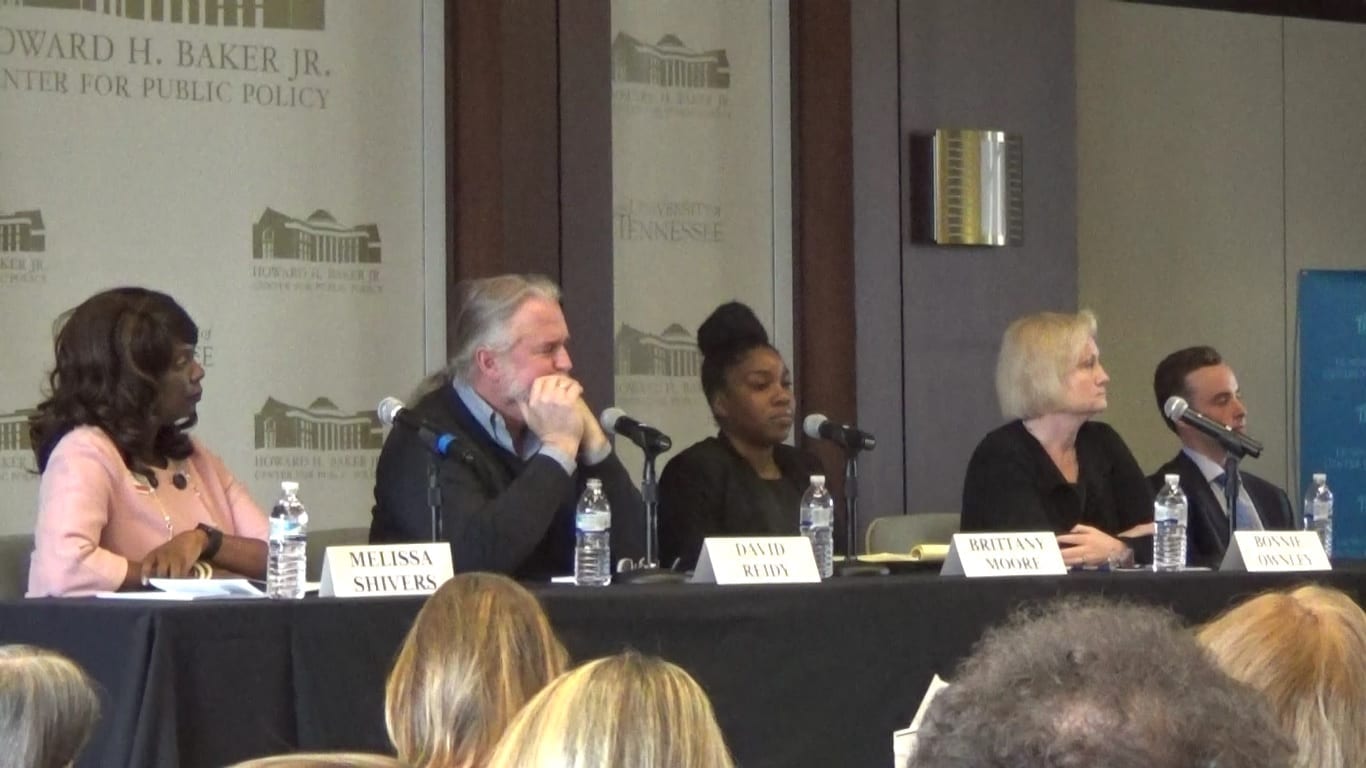Panelists discuss First Amendment rights and its protection on campus
Students, faculty and members of the community gathered in the Toyota Auditorium on Monday to get a better understanding of the first amendment on campus.

On Feb. 27, The Toyota Auditorium was filled with people, eagerly waiting to hear a panel discussion moderated by Jeffery Rosen, the current President and CEO of the National Constitutional Center in Philadelphia.
The event was kicked off with a video presentation of the importance of the First Amendment on UT’s campus from the perspectives of student and faculty alike.
Rosen began the event with a 20 minute speech regarding his position with the NCC, and the history of the Constitution itself. Regarding the the NCC he stated, “Our mandate is to unite liberals, conservatives, and everyone in between to converge around this great document of human freedom which unites us.”
Shortly after, the panel filed in consisting of the following: Barry Hawkins, a senior undergraduate majoring in Sociology; Dr. Bonnie Ownley, professor and Graduate Director specializing in Soilborne Plant Pathology and Biological Control; Brittany Moore, a third year Law Student at UT and President of the Black Law Students Association at UT; David Reidy, professor of Philosophy and Adjunct Professor of Political Science; and Dr. Melissa Shivers, Assistant Vice Chancellor for Student Life and Strategic Initiatives.
The panel engaged in a two round discussion, with the each round followed by an audience Q&A. They opened the panel with each individual’s thoughts on First Amendment and its protection on UT’s campus.
Hawkins talked about an article he wrote for the Daily Beacon regarding safe spaces, and the importance of free speech on this campus.
He said, “I feel as though free speech is fundamental aspect of a university and anything that aims to limit that sort of extinguishes the flame of learning which is meant to kindle it.”
Ownley emphasized how seriously UT’s campus regards free speech, and the importance of having an atmosphere that allows free exchange of all thoughts.
“I want to assure you that we take free speech and academic freedom very seriously,” Ownley said. “We want a campus atmosphere that allows for free exchange of thoughts and ideas, we want to include a wide variety of people in those conversations and we want to do that with civility.”
Moore spoke about a controversial tweet by a Law professor on campus regarding the Charlotte protest, negating hate speech with “other kinds” of speech.
“As you’ve learned today, the best way to drive out any type of offensive speech or bad speech is to promote other types of speech. So I hosted a forum at UT Law, which basically gave the students, faculty, staff, a platform to talk about the tweet, and how to become more inclusive at our law school..”
Reidy discussed how his profession allows him to point various distinctions, fallacies and ultimately come up with a logical conclusion regarding a particular subject.
“There are multiple senses of toleration, that we often tend to conflate. There are multiple senses of reasonableness and civility in public discourse we tend to conflate,” he said. “Different sorts of forum we tend to conflate. And as I say, philosophers like to make distinctions and occasionally point out fallacies and equivocation is one of them.”
Shivers opened with how various university, including UT, have been educating students and faculty alike in how to properly deal and report incidents regarding hate speech or anything in relation to.
In her statement regarding her position at UT, Shivers stated, “We have an opportunity to educate our students on what do we deem as appropriate, so what are the ways we can educate you on how you can go about reporting incidents of bias, but also things that we have to tell them about the importance of free speech. While we may not like what someone says, we have to honor and recognize that is their opinion, and they have a right to share it.”
The first round discussed topics relating to the controversial tweet, and the growing influence of social media on personal, national and global affairs. The second round opened with a question of if any incidents of free speech being attacked has occurred on UT’s campus, along with a discussion of safe spaces.
The panelists generally were very direct and open with their responses to the questions presented, and were given adequate time to state their opinion but also giving respect to other panelists.
When it came time to ask the audience questions, one lady asked if it was appropriate for the university to pull funding from a controversial book, solely on the title. Reidy stated that they would not, however grants are sparsely given and it helps to be a person of note within your field of study should you want one.
There was also a question of defunding sororities and fraternities across the United States, and that anyone involved with either could not hold a position of leadership on campus. After a response from Hawkins, a student and member of Alpha Chi Omega was quick to point out that her sorority was openly allowing all who identify as women.
The panel discussion concluded after the Q&A.
Edited by Kaitlin Flippo
Featured Image by Alexander Overlay

